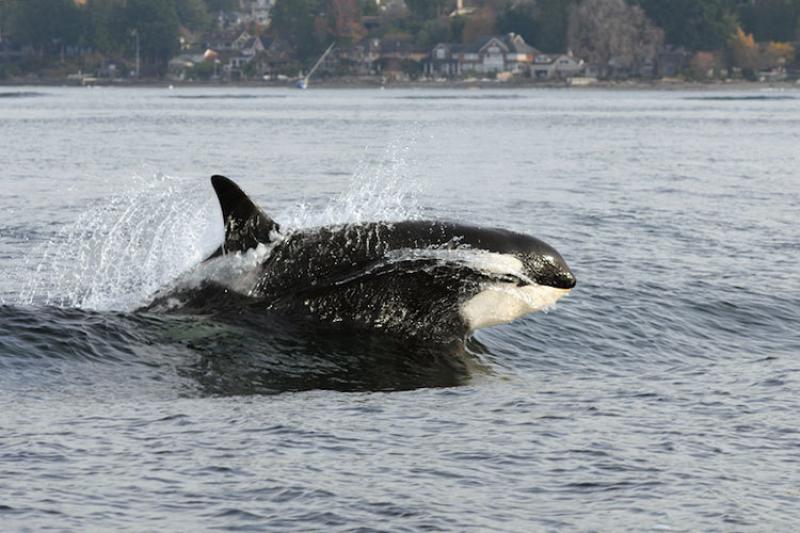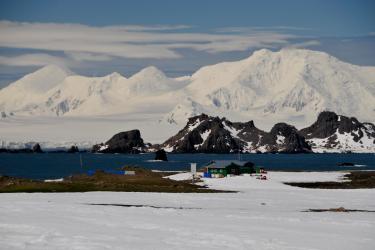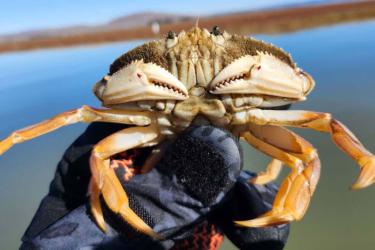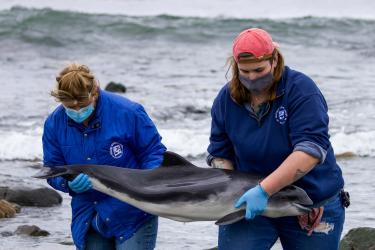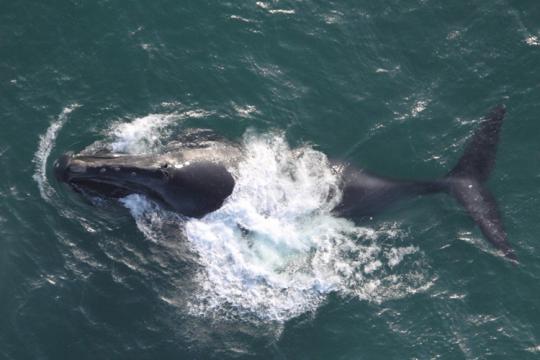This month, NOAA Fisheries is helping orca fans everywhere learn about and help protect endangered Southern Resident killer whales (called orcas) and other killer whales in the Northwest. Join us for a month of interesting webinars, educational opportunities, and outdoor activities.
Washington Gov. Jay Inslee has again proclaimed June Orca Action Month, which is organized by Orca Network and the members of the Orca Salmon Alliance.
“This is a time to consider what Southern Residents mean to the Northwest, and the whole West Coast,” said Scott Rumsey, Deputy Regional Administrator of NOAA Fisheries West Coast Region. “We are fortunate to live in a place with these wild predators, and we have a responsibility to look out for them. Whether it’s reducing polluted stormwater by planting a rain garden, or saving energy by walking instead of driving, we all can contribute.”
Many events this year will be online, expanding their reach not only across the country but around the world. Whether you live in Puyallup or Paris, you can ask biologists questions about the latest orca science. You can also join in interactive exercises that will provide new insight in how our personal actions can contribute to orca recovery.
An in-person kick-off event on June 6 helps start the activities. They will include socially-distanced volunteer habitat restoration such as restoring stream habitat on Chico Creek in Kitsap County and at Bothell’s largest park, the former Wayne Golf Course. Weekend kayak tours will explore Elliott Bay and the Duwamish River with guest speakers explaining the threats facing Southern Resident orcas.
Events
Join NOAA for the following online activities and events to celebrate Orca Month:
All Month
NOAA's Online Orca Coloring Contest
Get out your crayons and markers! Print and complete NOAA Fisheries' Southern Resident Killer Whale Coloring Book. Email photos of your completed coloring book to orca.plan@noaa.gov by June 30. Winners will be announced in July on Facebook and Twitter and will receive a NOAA Southern Resident Killer Whale poster for their wall!
Wednesday, June 9 at 4:00pm PDT
Killer Whale Tales NOAA Live Event!
Join NOAA Fisheries' Southern Resident Killer Whale Recovery Coordinator Lynne Barre and founder of Killer Whale Tales, Jeff Hogan, for a NOAA Live! Webinar event hosted by Wood Hole Oceanographic Institution. Through online exercises, the interactive Killer Whale Tales program inspires students to take action to contribute to the health of Chinook salmon and the endangered whales that need them to survive. This webinar will be recorded and posted afterwards with English captions and Spanish subtitles. Best for grades 2-8, but all ages will enjoy.
Thursday, June 17 12:00pm PDT
Webinar Salmon & Orcas: The Stories of Science with NOAA Fisheries & Lynda Mapes
This webinar is presented by NOAA’s Olympic Coast National Marine Sanctuary and NOAA Fisheries West Coast Region and Northwest Fisheries Science Center
The new book ORCA: Shared Waters, Shared Home, due out in June 2021, describes how NOAA Fisheries scientists seek to unravel connections between endangered Southern Resident killer whales, threatened Puget Sound Chinook salmon, and the rest of the marine ecosystem. Hear from those scientists and an award-winning journalist who covers them as they examine the smallest organisms in the ocean, looking for clues to understanding salmon survival. Hear also from the biologists who have recently identified the sources of Southern Resident prey across the West Coast. Together they will tell the stories of salmon survival and the native Northwest habitat our salmon and steelhead depend on—and that we can all help restore.
Learn more and register for the webinar here
Speakers
Lynda Mapes is a Seattle Times reporter and author of the new book, ORCA: Shared Waters, Shared Home. Lynda's series, Hostile Waters: Orcas in Peril told the stories of the Southern Residents and threats to their survival. Mapes and her colleagues shared the 2019 AAAS Kavli Science Journalism Gold Award for the series.
Lynne Barre is the Recovery Coordinator for the Southern Resident killer whales and Branch Chief of NOAA Fisheries Protected Resources Division in Seattle. She has worked on Southern Resident killer whale recovery since 2003, and has led the development of a proposal to protect critical habitat for the whales and an Action Plan for their recovery.
Brian Burke leads the Ocean Ecology Team at NOAA's Northwest Fisheries Science Center. He focuses on how ocean conditions and other factors affect the habitat and survival of Pacific Chinook and other salmon and steelhead. He was chief scientist of a NOAA research voyage off the Northwest Coast that Lynda Mapes joined and reported on in 2019.
Brad Hanson is a wildlife biologist and ecologist with NOAA's Northwest Fisheries Science Center studying foraging and habitat use of Southern Resident killer whales. He leads the Science Center’s research on Southern Residents and recently published new research on Southern Resident prey.
Marla Holt is a Research Wildlife Biologist at the Northwest Fisheries Science Center, focusing on acoustics. She has led research using digital acoustic recording tags, temporarily affixed to whales with suction cups, to understand their behavior and the underwater soundscape. She is interested in how the whales use sound, especially during foraging, and are affected by sound from other sources.
